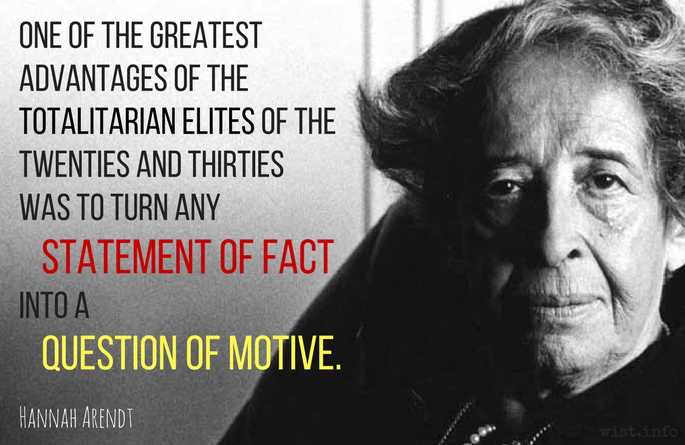The transition from day to night is bewilderingly swift. Despite what many assume, civilized coexistence in a culture of tolerance is not always the norm, or even universally desired. Democracy is a hard-won, easily rolled back state of affairs from which many secretly yearn to be released.
Uki Goñi (b. 1953) Argentine historian, author
“‘Silence Is Health’: How Totalitarianism Arrives,” New York Review of Books (20 Aug 2018)
(Source)
Quotations about:
totalitarianism
Note not all quotations have been tagged, so Search may find additional quotes on this topic.
If we look at the techniques of totalitarian government, it is obvious that the argument of “the lesser evil” — far from being raised only from the outside by those who do not belong to the ruling elite — is one of the mechanisms built into the machinery of terror and criminality. Acceptance of lesser evils is consciously used in conditioning the government officials as well as the population at large to the acceptance of evil as such.
Hannah Arendt (1906-1975) German-American philosopher, political theorist
“Personal Responsibility Under Dictatorship” (1964)
(Source)
Totalitarianism appeals to the very dangerous emotional needs of people who live in complete isolation and in fear of one another.
Hannah Arendt (1906-1975) German-American philosopher, political theorist
Interview with Roger Errera (Oct 1973), The New York Review of Books (26 Oct 1978)
(Source)
Totalitarianism begins in contempt for what you have. The second step is the notion: “Things must change — no matter how, Anything is better than what we have.” Totalitarian rulers organize this kind of mass sentiment, and by organizing it articulate it, and by articulating it make the people somehow love it.
Hannah Arendt (1906-1975) German-American philosopher, political theorist
Interview with Roger Errera (Oct 1973), The New York Review of Books (26 Oct 1978)
(Source)
From the totalitarian point of view history is something to be created rather than learned. A totalitarian state is in effect a theocracy, and its ruling caste, in order to keep its position, has to be thought of as infallible. But since, in practice, no one is infallible, it is frequently necessary to rearrange past events in order to show that this or that mistake was not made, or that this or that imaginary triumph actually happened. Then again, every major change in policy demands a corresponding change of doctrine and a revelation of prominent historical figures. This kind of thing happens everywhere, but is clearly likelier to lead to outright falsification in societies where only one opinion is permissible at any given moment. Totalitarianism demands, in fact, the continuous alteration of the past, and in the long run probably demands a disbelief in the very existence of objective truth.
George Orwell (1903-1950) English writer [pseud. of Eric Arthur Blair]
“The Prevention of Literature,” Polemic (Jan 1946)
(Source)
Any power must be the enemy of mankind which enslaves the individual by terror and force, whether it arises under a Fascist or Communist flag. All that is valuable in human society depends on the opportunity for development accorded to the individual.
Albert Einstein (1879-1955) German-American physicist
Press statement, England (15 Sep 1933)
(Source)
The disturbing factor in the success of totalitarianism is rather the true selflessness of its adherents: it may be understandable that a Nazi or Bolshevik will not be shaken in his conviction by crimes against people who do not belong to the movement or are even hostile to it; but the amazing fact is that neither is he likely to waver when the monster begins to devour its own children, and not even if he becomes a victim of persecution himself, if he is framed and condemned, if he is purged from the party and sent to a forced-labor or concentration camp. On the contrary, to the wonder of the whole civilized world, he may even be willing to help in his own prosecution and frame his own death sentence if only his status as a member of the movement is not touched.
Hannah Arendt (1906-1975) German-American philosopher, political theorist
The Origins of Totalitarianism, Part 3, ch. 10 “A Classless Society,” sec. 1 (1951)
(Source)
A mixture of gullibility and cynicism had been an outstanding characteristic of mob mentality before it became an everyday phenomenon of masses. In an ever-changing, incomprehensible, world the masses had reached the point where they would, at the same time, believe everything and nothing, think that everything is possible and that nothing was true. The mixture in itself was remarkable enough, because it spelled the end of the illusion that gullibility was a weakness of unsuspecting primitive souls and cynicism the vice of superior and refined minds.
Hannah Arendt (1906-1975) German-American philosopher, political theorist
The Origins of Totalitarianism, Part 3, ch. 11 “The Totalitarian Movement,” sec. 2 (1951)
(Source)
The ideal subject of totalitarian rule is not the convinced Nazi or the convinced Communist, but people for whom the distinction between fact and fiction (i.e., the reality of experience) and the distinction between true and false (i.e., the standards of thought) no longer exist.
Hannah Arendt (1906-1975) German-American philosopher, political theorist
The Origins of Totalitarianism, Part 3, ch. 13 “Ideology and Terror” (1951)
(Source)
One of the greatest advantages of the totalitarian elites of the twenties and thirties was to turn any statement of fact into a question of motive.
Hannah Arendt (1906-1975) German-American philosopher, political theorist
(Spurious)
This is frequently cited to Arendt, often to The Origins of Totalitarianism, (1951), but is not found as such in her works. The source appears to be a paraphrase of Arendt in a 1999 New Yorker article.
Stuart Elden suggested the following from The Origins of Totalitarianism, Part 3, ch. 11, might be original quotation the paraphrase was built on, though the overall meaning is different:
The elite is not composed of ideologists; its members’ whole education is aimed at abolishing their capacity for distinguishing between truth and falsehood, between reality and fiction. Their superiority consists in their ability immediately to dissolve every statement of fact into a declaration of purpose.
The only thing I really can’t tolerate is intolerance. I’m a fuzzy-headed warm-hearted liberal, and I think fuzzy-headed warm-hearted liberalism is an ideological stance that needs defending — if necessary, with a hob-nailed boot-kick to the bollocks of budding totalitarianism. Mutual respect and tolerance is great, but it doesn’t work without the mutuality.
Charles "Charlie" Stross (b. 1964) British writer
“Multiculturalism or Liberalism?” Charlie’s Blog (30 May 2002)
(Source)
All State propaganda exalts comradeship, for it is this gregarious herd-sense and herd-smell which keeps people from thinking and so reconsiles them to the destruction of their private lives.
Cyril Connolly (1903-1974) English intellectual, literary critic and writer.
“Ecce Gubernator,” The Unquiet Grave (1945)
(Source)
Totalitarianism is never content to rule by external means, namely, through the state and a machinery of violence; thanks to its peculiar ideology and the role assigned to it in this apparatus of coercion, totalitarianism has discovered a means of dominating and terrorizing human beings from within.
Hannah Arendt (1906-1975) German-American philosopher, political theorist
The Origins of Totalitarianism, Part 3, ch. 10 “A Classless Society”, sec. 1 (1951)
(Source)
It is high time that we stopped thinking politically as Republicans and Democrats about elections and started thinking patriotically as Americans about national security based on individual freedom. It is high time that we all stopped being tools and victims of totalitarian techniques — techniques that, if continued here unchecked, will surely end what we have come to cherish as the American Way of Life.
Margaret Chase Smith (1897-1965) American politician (US Senator, Maine)
“Declaration of Conscience,” Congressional Record, vol. 96, 81st Congress, 2d. sess. (1 Jun 1950)
(Source)








